Our Academics
Unicent recognizes the great diversity in backgrounds, needs, and aspirations of its students and enriches the curriculum that meets these needs while operating within the guidelines established by the CBSE.
Our Academics
Unicent recognizes the great diversity in backgrounds, needs, and aspirations of its children and enriches the curriculum that meets these needs while operating within the guidelines established by the CBSE.
Our Curriculum
While placing a strong emphasis on basic curriculum including Science, Math, Social Sciences, English, and the Arts, thrust is equally laid on co-curricular activities that impart essential life skills and soft skills. Curriculum at Unicent facilitates great flexibility in the presentation of subject matter to maintain the student’s interest. It focuses on the communication and presentation skills and also improves the thinking and analytical skills of the students. We evaluate school offerings on a continuous basis, so as to include studies appropriately related to the social and academic changes in our society.
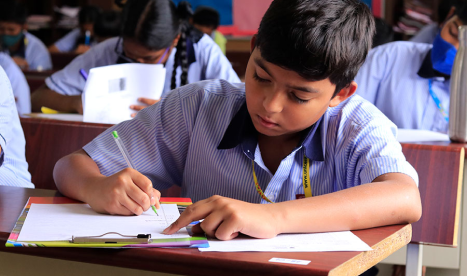
Holistic education demands development of all aspects of individual’s personality including
cognitive, affective and psycho-motor domains. Focusing on excellence in academics alone undoubtedly results in a lop-sided development of the personality. It is thus essential that due importance be given to participation in co-curricular activities like music, dance, art,
dramatics and other areas of one’s interest to make life more fulfilling and enjoyable.
Emphasis is given to age specific sports, cultural and literary activities that keeps the students physically fit and mentally agile
While placing a strong emphasis on basic curriculum including Science, Math, Geography, English, and the Arts, thrust is equally laid on co-curricular activities that impart essential life skills. Curriculum at Unicent facilitates great flexibility in the presentation of subject matter to maintain child’s interest. It focuses on communication and presentation skills and also improves the thinking and analytical skills of the students. We evaluate school offerings on a continuous basis, so as to include studies appropriately related to the social and academic changes in our society.

Holistic education demands development of all aspects of individual’s personality including cognitive, affective and psycho motor domains. Focusing on excellence in academics alone undoubtedly results in lop-sided development of personality. It is thus essential that due importance be given to participation in co-curricular activities like music, dance, art, dramatics and other areas of one’s interest to make life more fulfilling and enjoyable. Emphasis is given to age specific sports and activity that keeps children physically fit.
Our Curriculum
Methodology
Unicent School derives its philosophy from the research work done by the CBSE on education, and its impact and relevance in modern times…
CBSE has become one of the most sought-after school boards in India. The Board takes initiatives to keep the curriculum upgraded with the latest trends in education and in accordance with the needs of time, The main aim is to develop and assess the children not only academically abut also in Life Skills, Attitudes, Citizenship Values, Education in Fine Arts, and so on. All round development as the stated purpose of education implies optimization of hidden potential of every child in the physical, intellectual, mental and spiritual planes.
Globalisation in every sphere of the society has important implications for education. The increasingly competitive environment into which schools are being drawn and the aspirations of parents place a tremendous burden of stress and anxiety on children; to the detriment of their personal growth and development, and thus hamper the joy of learning. The challenge for schools is to strike a balance between maintaining a rigour in curriculum and keep the zest for learning alive in students.
The methodology developed and followed in Unicent is based on learning theories like Vygotsky’s Constructivism, Howard Gardner’s Multiple Intelligence and Bloom’s Taxonomy. Learning by itself is a developmental process which emphasizes on two fold objectives. The first is continuity in teaching, assessment and evaluation of broad based learning and behavioural outcomes. At Unicent we emphasise that evaluation of identified aspects of students’ ‘growth and development’ is a continuous process rather than events, built into the total teaching-learning process and spread over the entire span of academic session and schooling years. Secondly, we also attempt to cover the co-curricular aspects of students’ growth and development through real-time experiences, hands-on experiments and competitions.
Since abilities, attitudes and aptitudes can manifest themselves in forms other than only in the written words, a variety of tools and techniques are applied and we aim at developing and assessing a learner’s development in higher order thinking skills as well such as analyzing, evaluating and creating. Assessment during the course of studies is based on a variety of evidences and lead to diagnosis of learning gaps and their remediation whenever required.
Unicent School, is affiliated to CBSE and follows the curriculum to the greatest extent with reference to letter and spirit, modifying it to make it contextually relevant for the students.
Pre-school- Nursery, LKG and UKG
Children have a natural yearning to find out, and Unicent provides just that right environment and stimulation for it. The teaching methodologies are carefully designed to help build interest, and motivate the students in their pursuit for gaining knowledge.
The syllabus comprises of developing largely the pre-writing and reading skills, pre-mathematical skills and gross motor and fine-motor skills.
It also nurtures children to ensure that they retain their natural instinct – where they are incharge of their own learning through the ‘Plan-do-Review’ cycle specially followed during the Activity Time which is also the time for student initiated leaning.
Our Pre-school Programme comprises of the following activities:
Dramatisation through role plays and puppet shows
Show and Tell
Art and Crafts, Origami, Clay-modeling
Circle Time
Indoor games
Music and Dance
Storytelling through various ways
Water and Sand play
Outdoor games and physical fitness exercises
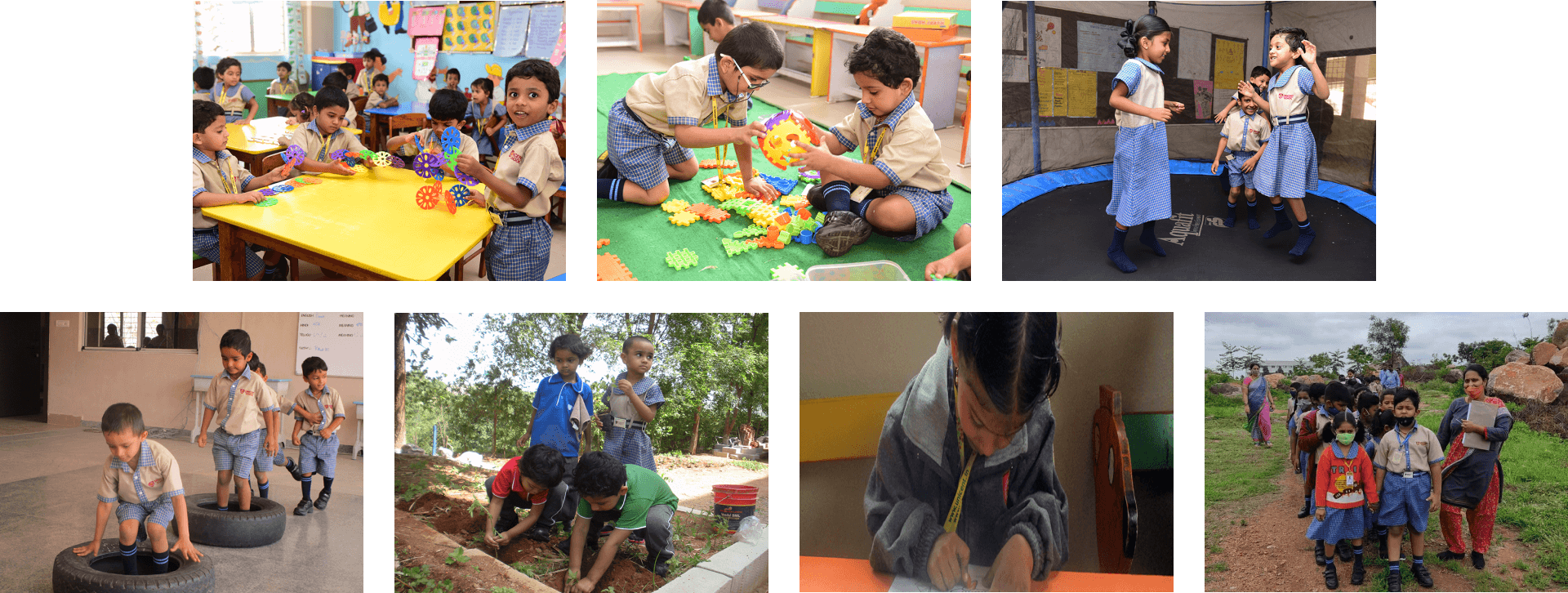
Primary School-Classes I to IV
Our learning programme gives young learners the framework to develop skills in English, Math, Science, Social Studies and Languages. It helps children learn how to ask questions, explore the options and discover solutions on their own. Emphasis on Language Arts (reading, writing, speaking and listening), for effective communication, is a priority. Teaching and learning is enhanced with the help of audio-visual aids and other content and resources developed by our in-house research team.
Significant features:
Extensive Orals for developing speaking skills
Experiential learning with Field trips
Nurturing the spirit of enquiry
Importance on understanding and application
Opportunities to discover knowledge
Planned revision
Use of audio-visual aids
Developing qualities of leadership with emphasis on social responsibilities
Learning beyond the textbook and relating to real life experiences
Creative and aesthetic sense
Being able to learn without feeling the stress/coping with stress
Engaging homework for enhancing learning and maintaining the curiosity of children

Secondary-Classes V-X
The sensitive transition from primary to secondary is carefully planned, to prepare students for the more formal and structured style of learning in the secondary years. The instructional elements in the classroom, the testing procedures and the examination procedures change to increase the rigour of the curriculum delivery. Group Counselling, Individual Counseling and Adolescent Education become an important and integrated part of the class room processes to ensure that the children develop the ability to cope with the changes and are better prepared to face life after the cocooned years of schooling.
Important Characteristics
Project Work and Mini-Researches
Presentations and Public Speaking Skills
Home Assignments
Extensive Writing Work Practice for Examinations with Practice Worksheets
Development of Referencing Skills
Development of Critical Thinking Skills
An interdisciplinary approach with an international dimension
Hands on Lab Work
Significant features:
Extensive Orals for developing speaking skills
Experiential learning with Field trips
Nurturing the spirit of enquiry
Importance on understanding and application
Opportunities to discover knowledge
Planned revision
Use of audio-visual aids
Developing qualities of leadership with emphasis on social responsibilities
Learning beyond the textbook and relating to real life experiences
Creative and aesthetic sense
Being able to learn without feeling the stress/coping with stress
Engaging homework for enhancing learning and maintaining the curiosity of children
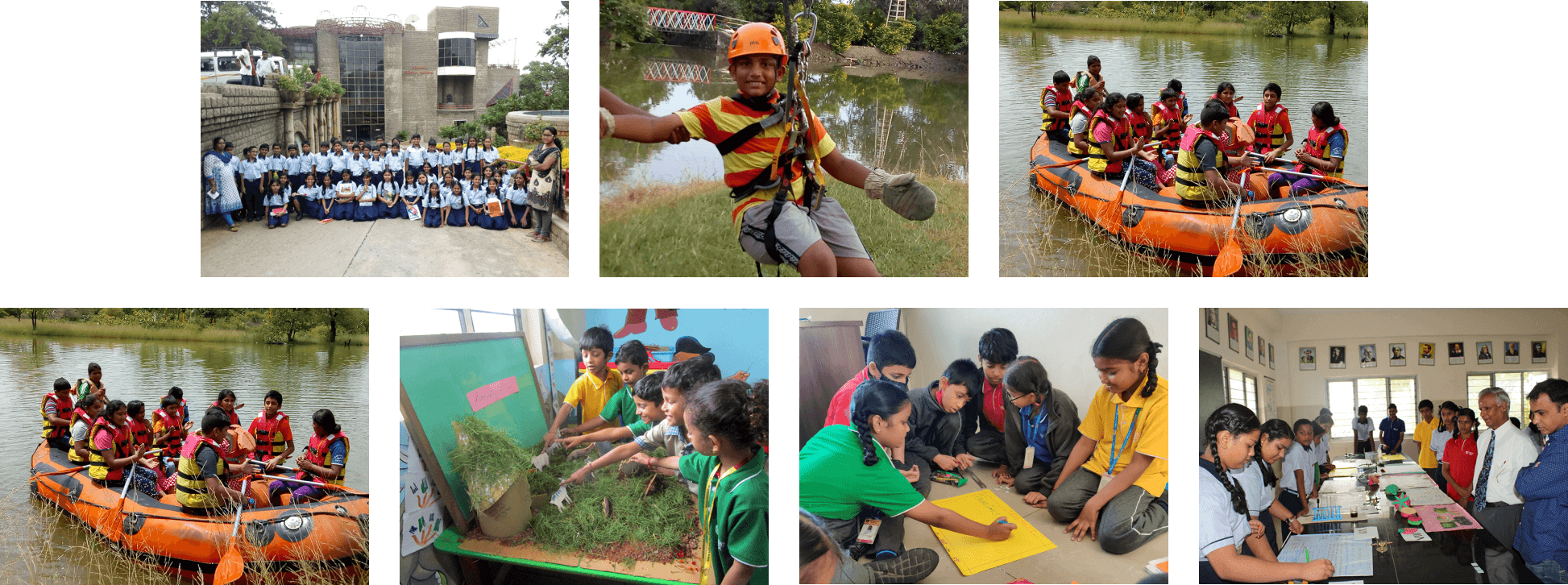
Remedial Teaching
Remedial teaching forms a part of the teaching learning cycle to ensure that either–
. Diagnostic tests are carried out to identify learning gaps.
. Learning gaps are addressed through early interventions.
. Children with learning difficulties or gaps are provided constant support.
. Constant academic help is given within school hours through additional practice and constant follow up especially for higher classes.
. Personal effectiveness and many more
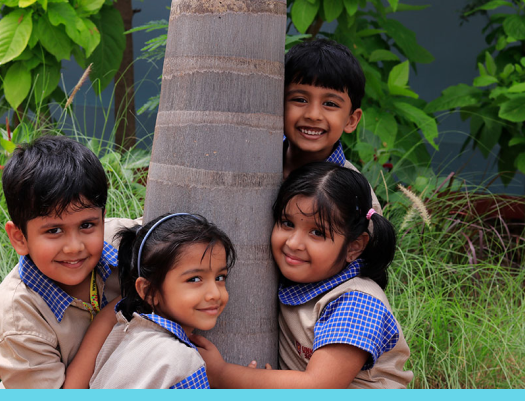
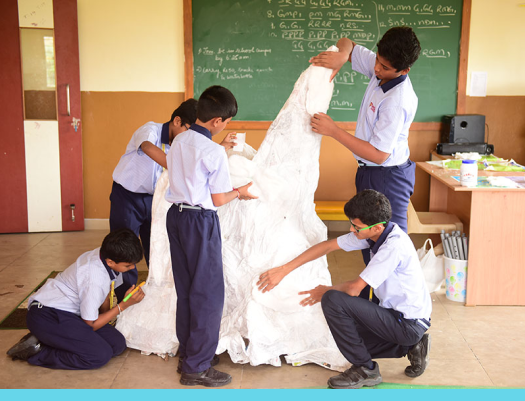
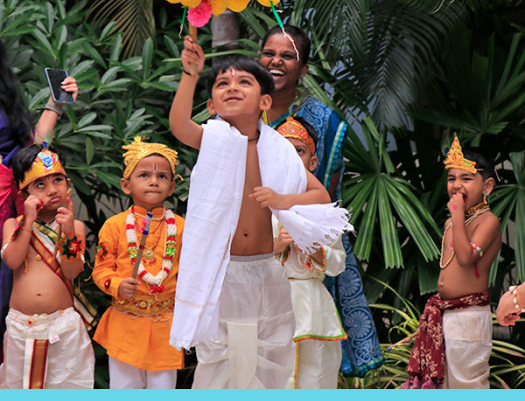

Teacher Training
“In Learning you will teach and in teaching you will learn” – Phil Collins
Programmes for Developing Teachers
Building and sustaining quality in school education is the need of the hour. Rapidly changing social and technological environment around the child calls for a research based approach to address the growing challenges in schooling. These challenges cut across the curriculum, methodologies, teacher talent, home-school relations and beyond.
Unicent strategically addresses these challenges through its multi pronged initiatives that add tremendous value to the overall school environment.
Training Programmes of the School
Training programmes are institutionalized in the school as:
- Ongoing through mentoring and coaching by a team of experts and research personnel
- Specialized programmes
Effective delivery of school curriculum
Unicent believes that a school curriculum must be dynamic. The teachers not only design and develop pedagogy that enriches the school curricula but also periodically review the content and the practices, thus enriching the curriculum from time to time. Workshops are organized to empower the teachers to review the content and their own practices and modify them from time to time.
An inhouse group of teachers contribute extensively to teacher training and development through intervention and institutional modes. This enhances the competencies of teachers and helps them to deal efficiently with the dynamic curriculum. It also helps them to apply the innovations to the educational concepts in class room teaching – learning processes.
These academic leaders not only train but also hand hold the teachers to ensure their effective functioning through out the academic year.
Types of Training Programmes
- Early Childhood Development and Education
- Curriculum Development
- Pedagogical practices
- Effective Classroom Management
- Communication Skills and soft skills
- Teacher effectiveness
- Home-School Continuum
- Leadership training
- Mental well-being and wellness
- Technological skills
- Innovation Ambassadors program
- Peer leadership
- Personal Effectiveness etc.
Modes of Training Programmes
Workshops, Seminars, Presentations, Micro-teaching, Demonstrations, Online sessions, Sensitization programmes and so on.
Educational Research and Development
Continuous research on topics and issues touching the major stakeholders of the school viz; children, teachers and parents forms a part of the schools process.
Want your kids to DREAM BIG?





Teacher Training
“In Learning you will teach and in teaching you will learn” – Phil Collins
Programmes for Developing Teachers
Building and sustaining quality in school education is the need of the hour. Rapidly changing social and technological environment around the child calls for a research based approach to address the growing challenges in schooling. These challenges cut across the curriculum, methodologies, teacher talent, home-school relations and beyond.
Unicent strategically addresses these challenges through its multi pronged initiatives that add tremendous value to the overall school environment.
Training Programmes of the School
Training programmes are institutionalized in the school as:
- Ongoing through mentoring and coaching by a team of experts and research personnel
- Specialized programmes
Effective delivery of school curriculum
Unicent believes that a school curriculum must be dynamic. The teachers not only design and develop pedagogy that enriches the school curricula but also periodically review the content and the practices, thus enriching the curriculum from time to time. Workshops are organized to empower the teachers to review the content and their own practices and modify them from time to time.
An inhouse group of teachers contribute extensively to teacher training and development through intervention and institutional modes. This enhances the competencies of teachers and helps them to deal efficiently with the dynamic curriculum. It also helps them to apply the innovations to the educational concepts in class room teaching – learning processes.
These academic leaders not only train but also hand hold the teachers to ensure their effective functioning through out the academic year.
Types of Training Programmes
- Early Childhood Development and Education
- Curriculum Development
- Pedagogical practices
- Effective Classroom Management
- Communication Skills and soft skills
- Teacher effectiveness
- Home-School Continuum
- Leadership training
- Mental well-being and wellness
- Technological skills
- Innovation Ambassadors program
- Peer leadership
- Personal Effectiveness etc.
Modes of Training Programmes
Workshops, Seminars, Presentations, Micro-teaching, Demonstrations, Online sessions, Sensitization programmes and so on.
Educational Research and Development
Continuous research on topics and issues touching the major stakeholders of the school viz; children, teachers and parents forms a part of the schools process.


